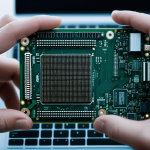The Role of Internet Technologies in Transforming UK Healthcare
Internet technologies have been central to UK healthcare innovation, driving a profound digital transformation that elevates care quality. The widespread adoption of digital health records enables clinicians to access comprehensive, up-to-date patient data swiftly. This enhances diagnostic accuracy and streamlines decision-making, resulting in better patient outcomes.
Telemedicine has expanded significantly, allowing healthcare providers to monitor patients remotely and offer consultations without physical visits. This not only improves access for patients in rural or underserved areas but also reduces pressure on healthcare facilities. Remote patient monitoring systems leverage internet technologies to track vital signs continuously, alerting clinicians to potential issues early.
Additional reading : The impact of emerging technologies on privacy: what should we prioritize in the digital age?
Patient portals are integrated into many NHS platforms, giving individuals direct access to their health information, appointment scheduling, and test results. This empowers patients to take a proactive role in managing their health, fostering engagement and satisfaction.
Together, these internet technologies form a cohesive digital ecosystem that transforms UK healthcare, improving efficiency, accessibility, and patient-centered care—all essential aspects of today’s healthcare landscape.
Also to read : How does the UK education system integrate digital skills?
The Role of Internet Technologies in Transforming UK Healthcare
Internet technologies have become pivotal in driving UK healthcare innovation, reshaping patient care and service delivery. A key element is the widespread adoption of digital health records. These electronic systems consolidate patient data, enabling more accurate, timely information exchange. This shift has notably improved care quality by reducing errors and facilitating coordinated treatment across providers.
Telemedicine has also surged, supported by expanding internet infrastructure. Patients can access consultations remotely, which is especially beneficial for those with mobility issues or residing in rural areas. Remote patient monitoring technologies allow continuous health data collection, alerting clinicians to potential issues before they escalate. This real-time connection enhances both the effectiveness and responsiveness of treatment plans.
Additionally, patient portals grant individuals direct access to their personal health information. These platforms empower patients to track appointments, review test results, and communicate with healthcare teams securely. Such integration promotes patient engagement, supporting proactive health management. Collectively, internet technologies enable a digital transformation that fosters a more connected, efficient, and patient-centred UK healthcare system.
The Role of Internet Technologies in Transforming UK Healthcare
Internet technologies underpin the remarkable digital transformation reshaping UK healthcare. Central to this shift is the widespread adoption of digital health records, which consolidate patient data into accessible, real-time formats. Clinicians benefit from quick, comprehensive information retrieval, enhancing diagnostic precision and accelerating treatment decisions. This streamlined access supports improved care quality across healthcare settings.
Telemedicine further amplifies UK healthcare innovation by expanding access to care. Through internet-powered consultations, patients avoid travel burdens, especially in remote areas, while providers maintain continuity of care. Remote patient monitoring systems utilize internet technologies to gather ongoing health data, enabling early intervention by alerting clinicians to changes in vital signs or symptoms. This proactive approach reduces hospital admissions and enhances chronic disease management.
Patient portals integrate seamlessly with NHS digital services, granting users secure, direct access to their medical records, appointment bookings, and test results. This transparency fosters patient empowerment, encouraging active participation in health management and enhancing satisfaction. Collectively, these internet technologies drive efficiency, accessibility, and patient-centred care—cornerstones of modern UK healthcare innovation.
The Role of Internet Technologies in Transforming UK Healthcare
Internet technologies have revolutionised UK healthcare innovation by driving a comprehensive digital transformation that enhances care delivery. The adoption of digital health records stands as a foundation, enabling healthcare professionals to access accurate, real-time patient data. This accessibility reduces errors and accelerates clinical decisions, directly improving care quality.
Telemedicine has evolved through robust internet connectivity, expanding healthcare access beyond traditional settings. It supports remote consultations, which are crucial for patients in remote or mobility-restricted situations. Remote patient monitoring utilizes internet-enabled devices to continuously collect vital health data, alerting clinicians promptly to emerging concerns. This ongoing monitoring helps prevent complications and tailors treatment more effectively.
Patient portals exemplify further integration by providing individuals direct access to their health records, appointment schedules, and test results. This transparency empowers patients to participate actively in their care journey. By linking patients and providers, internet technologies facilitate clear communication and efficient management of health needs.
Through these advancements, internet technologies are not just tools but integral to UK healthcare innovation and its ongoing digital transformation, ultimately fostering a more responsive and patient-centred system.
The Role of Internet Technologies in Transforming UK Healthcare
Internet technologies serve as the foundation for the ongoing digital transformation in UK healthcare innovation. The widespread adoption of digital health records has revolutionised care quality by enabling instantaneous access to comprehensive patient information. This access minimizes errors, enhances diagnostic accuracy, and supports seamless communication between multidisciplinary teams, thereby ensuring coordinated treatment plans.
Telemedicine, powered by robust internet infrastructure, has expanded access to healthcare services, particularly benefiting patients in rural and underserved areas. Remote patient monitoring devices collect real-time health data, alerting clinicians to anomalies swiftly and enabling timely interventions. This proactive approach reduces hospital admissions and improves management of chronic conditions.
Integration of patient portals within NHS platforms gives patients secure control over their health information. These portals facilitate appointment scheduling, test result access, and direct communication with healthcare teams, empowering patients to engage actively in their care journey. The synergy between digital health records, telemedicine, and patient portals exemplifies how internet technologies catalyse efficiency and elevate patient-centred care across the UK healthcare system.
The Role of Internet Technologies in Transforming UK Healthcare
Internet technologies are at the heart of the ongoing digital transformation in UK healthcare, fundamentally reshaping care delivery and quality. The adoption of digital health records has revolutionised how clinicians access and share patient data. By providing real-time, comprehensive information, these systems reduce errors and enable faster, more accurate clinical decisions—critical for improving care quality.
Telemedicine, powered by robust internet infrastructure, has expanded access to healthcare services nationwide. It enables remote consultations that ease access for patients, especially those with mobility challenges or living in rural areas. Alongside this, remote patient monitoring uses internet-connected devices to track vital health indicators continuously, allowing early detection of health issues before they escalate.
Patient portals are a key component of this ecosystem, giving individuals direct and secure access to their health information including test results and appointment schedules. This accessibility fosters patient engagement and supports proactive management of personal health. Together, these internet technologies bolster UK healthcare innovation by enhancing accessibility, coordination, and patient-centred care.
The Role of Internet Technologies in Transforming UK Healthcare
Internet technologies have driven a digital transformation that extensively reshapes UK healthcare innovation. Central to this evolution is the adoption of digital health records, which improve care quality by centralising patient data and enabling instantaneous access. This shift reduces errors, facilitates comprehensive patient history review, and supports coordinated clinical decisions.
Telemedicine’s expansion further exemplifies internet technologies’ influence. It extends healthcare accessibility, especially in remote regions, by enabling virtual consultations. Complementing this, remote patient monitoring deploys internet-connected devices to track health metrics continuously, alerting clinicians to changes promptly. This proactive monitoring improves chronic disease management and reduces emergency hospital visits.
Integration of patient portals completes this ecosystem by granting patients direct access to their personal health information. These portals encourage active patient engagement by allowing users to manage appointments, view test results, and communicate securely with care teams. Together, these interconnected internet technologies establish a more efficient, accessible, and patient-centred healthcare system that embodies the essence of UK healthcare innovation.
The Role of Internet Technologies in Transforming UK Healthcare
Internet technologies have dramatically boosted UK healthcare innovation, primarily through the widespread adoption of digital health records. These records provide instant, precise patient data, which enhances care quality by reducing medical errors and facilitating seamless information sharing across multidisciplinary teams. This digital transformation allows clinicians to make faster, more accurate decisions, significantly improving patient outcomes.
Telemedicine’s expansion is another key component. Enabled by internet technologies, it has revolutionised access to healthcare by allowing virtual consultations and continuous remote patient monitoring. Devices connected via the internet gather vital signs and health metrics in real time, alerting healthcare providers promptly to any abnormalities. This proactive monitoring reduces hospital admissions and supports chronic disease management more effectively.
Further enhancing patient engagement is the integration of patient portals within NHS systems. These portals grant secure access to personal health information, appointment bookings, and test results, encouraging patients to participate actively in their care. Consequently, internet technologies have become indispensable in creating a connected, efficient, and patient-centred healthcare environment across the UK.
The Role of Internet Technologies in Transforming UK Healthcare
Internet technologies continue to drive UK healthcare innovation by enabling the widespread adoption of digital health records that centralise patient information and improve care quality. These records offer clinicians rapid, comprehensive access to medical histories, which reduces errors and enhances diagnostic accuracy. The ability to share data seamlessly across providers supports coordinated, patient-centred care.
The expansion of telemedicine leverages internet connectivity to provide remote consultations, improving access for patients unable to attend in-person appointments due to location or mobility. This digital transformation includes remote patient monitoring, which uses internet-enabled devices to continuously track vital signs. Early alerts from these systems allow clinicians to intervene promptly, reducing hospital admissions and managing chronic illnesses more effectively.
Integration of patient portals empowers individuals by granting secure access to their health records, appointment schedules, and test results. These portals foster engagement and allow patients to manage their health proactively. Together, these internet technologies enhance efficiency, accessibility, and responsiveness, underscoring their critical role in transforming UK healthcare today.











